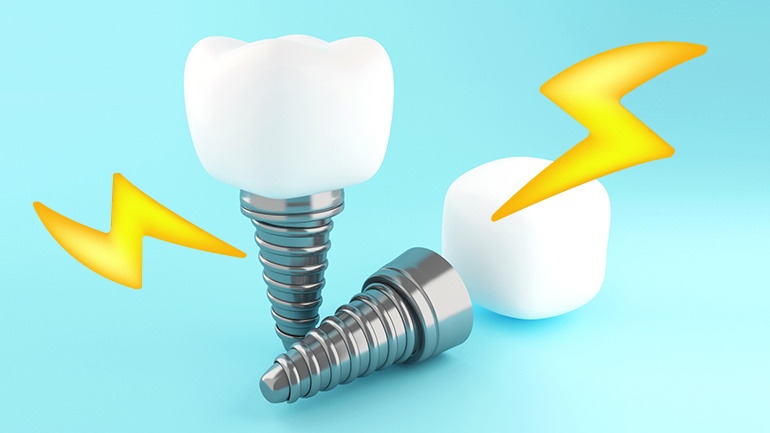
Experiencing a bit of pain after having an implant is usually expected. Nevertheless, if the pain lasts longer than it should or becomes too severe, it might mean something is wrong.
At Smile Center, we always aim to provide our patients with quality service and satisfaction. And even though we approach our procedures with utmost care and attention, it is never uncommon for patients to have pain after the implant.
This article will mention the primary causes of pain experienced after the implant and their solutions.
Tissue or Nerve Damage Might Have Occurred
One of the most significant causes of pain in the implant area is tissue and nerve damage. Although there are various reasons tissue damage might occur, the primary cause is the unintentional misplacement of the implant. Besides, neglecting oral care, which leads to bacteria build-up in the implant area, is another significant cause.
-
The most common symptoms of tissue damage are:
-
Numbness on the side of the implant,
-
Pain or discomfort in the area,
-
Experiencing tingling and burning in the gums,
Since tissue and nerve damage are significant issues, we recommend anyone who experiences these symptoms to see their dentist. Damaged nerves and tissue might cause potentially severe problems in the long term.
Having an Infection
Even though a healthy and well-cared implant might cause discomfort and pain for a short while, experiencing these symptoms for more than a week can indicate something more severe could be going on. An infection development is the most common explanation for experiencing such pain in the implant site.
Since an implant site requires attentive care, failing to do so might cause an infection. The typical symptoms of an infection development are:
-
Inflammation,
-
Pain and discomfort,
-
Bleeding gums,
-
Increased pocket depth in the implant area.
If diagnosed early, a dentist can treat an implant infection with antibiotics. Nevertheless, since infection will cause bone loss in the long term, treatment of mild or severe cases may require surgical operations.
Foreign Body Rejection
Sometimes, a patient's body might reject the implant and cause discomfort in the area. Although this is a relatively rare phenomenon, it is definitely not uncommon.
There might be various reasons why a patient's body rejects the implant. The most typical reason is usually an allergic reaction to the material used in the implant. Also, hypersensitivity reactions, inattentive care of the area or improper healing might cause rejection.
The most common symptoms of foreign body rejection are:
-
Pain at the implant area,
-
Swelling,
-
Tooth discomfort,
-
Various allergic reactions,
-
Inflamed gums,
-
Difficulty chewing or biting.
Thankfully, a dentist can replace a dental implant after rejection. Also, once they find the rejection reason, they can replace the implant with a higher success rate.
Insufficient Bone Healing Is Another Possibility
In some cases, sufficient bone healing might not occur, which causes severe pain and discomfort in the area. There are even cases where bones do not heal at all.
When there is a problem with bone healing, a disconnection between the implant and the bone appears. Since this might result in the rejection of the implant or loss of functionality, the best way to deal with inadequate bone healing is to remove the implant to treat the area.
In the case of inadequate bone healing, a dentist will examine the patient to discover the potential causes of the problem and try to treat it.
The Placement Area Might Be Sensitive
A simple yet common cause of pain in the implant area is sensitivity. Since the tissue around the implant will be sensitive after the operation, having sensitivity-caused pain in the area is an expected result. Therefore, pain-reducing drugs might usually be the best way to treat such conditions.
However, if sensitivity or pain in the area becomes too excessive, visiting a dentist for a check-on is recommended.
Bone Loss at the Implant Site
Feeling pain and discomfort at the implant site might indicate bone loss. Since implants directly connect to the jawbone, suffering from bone loss might cause excessive pain and rejection of the implant.
Fortunately, there are methods to attach an implant on a tooth that is not strong enough to hold an implant. If the patient knows they have bone loss in the area or the prior examinations reveal the problem, the dentist may use zygomatic dental implants or a bone graft.
Nevertheless, sometimes, the bone loss might not be known to the patient prior to the procedure. In such cases, the problem uncovers when the patient experiences severe pain and revisits their dentist. And the best way for a dentist to treat this issue is by removing the implant and replacing it with a suitable one.
Published Date: December 10, 2023



